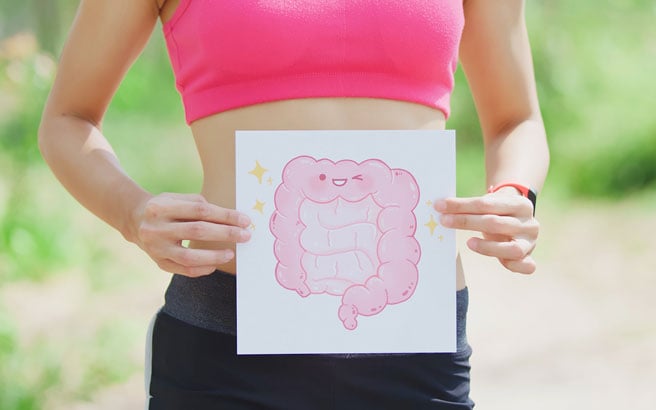In your gut is a complex ecosystem of 100 trillion micro-organisms including bacteria, viruses, fungi, archaea and protozoans (2 different types of single-cell organisms) – known as the gut microbiome. These organisms live in our gastrointestinal tracts – from our mouth all the way through to our anus.
What does the gut microbiome do?
Research is ongoing, but we know this microbiome plays a huge role in our health and risk of disease. There’s a relationship between us – the human host – and them – the microbes, working together for the benefit of both! They produce substances such as vitamins, short-chain fatty acids (these acids are produced when bacteria break down carbohydrates in your gut and are only around 6 carbon atoms long – hence “short chain”) and neurotransmitters (the chemical messengers in your body). These substances can affect our hormones, immune system, appetite and how some medications work – and this list is growing.
A happy, healthy gut
A plant-based diet that’s rich in fibre, polyphenols (compounds found in some plant food that can act as antioxidants) and fermented food has been linked to improved diversity of the gut microbiome. Fibre provides a food source for the organisms, which in turn produce metabolites (byproducts of chemical reactions in the body), such as short-chain fatty acids, that are beneficial to human health.
Fibre improves gut health in other ways, too. It helps increase the bulk of our stools (poo), which moves waste more quickly through the body and reduces the amount of time that waste spends inside the intestines.
Gut health and cancer
We have strong evidence that wholegrains and food containing dietary fibre reduce the risk of bowel cancer.
We also have evidence that women who eat more food containing fibre – both before and after a diagnosis – may have a lower risk of dying from breast cancer.
There is emerging evidence a healthy gut microbiome may enhance certain cancer treatments – but it’s too early to be sure.
How to get your FIB-RE-DAY
Adults in the UK are advised to eat 30g of fibre each day. This can come from:
- Fruit, vegetables, herbs and spices
- Wholegrains such as rice, barley, rye and wheat
- Pulses, lentils and beans
- Nuts, nut butters and seeds
To reduce your risk of developing cancer, start increasing the amount of fibre-rich food you eat.
For most people having cancer treatment or who’ve finished treatment, it’s a great move to eat more fibre. But for some people, such as those who’ve had some types of abdominal surgery, it may not be right to change your diet. Chat to your oncology team or dietitian if you have questions, or come along to one of World Cancer Research Fund’s online support groups for people with cancer and carers.
My top tips for increasing your fibre intake are:
- Explore and be curious – try new foods that are different colours.
- Take it slow as a big increase in fibre in a short time can increase wind and bloating for some people.
- Fresh, tinned, frozen and dried products all count and have different tastes and benefits.
- Try new recipes – World Cancer Research Fund’s free cookbooks are a great place to start.
- Do NOT stress – if you only like white pasta that’s OK! A variety of types of food and meals is what’s important in the long run.
- If you notice any changes to your bowel habits, make sure you talk to your doctor.
Read more
> Find out more about poor diet and cancer risk


 Oncology specialist dietitian Adele Hug looks at gut organisms and shares her top tips for how you can improve the health of your gut.
Oncology specialist dietitian Adele Hug looks at gut organisms and shares her top tips for how you can improve the health of your gut.